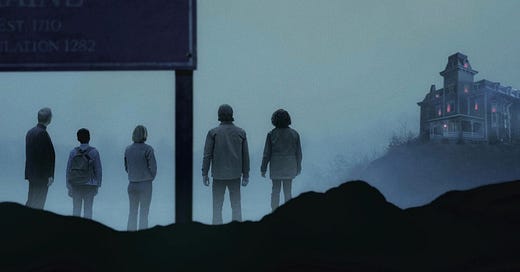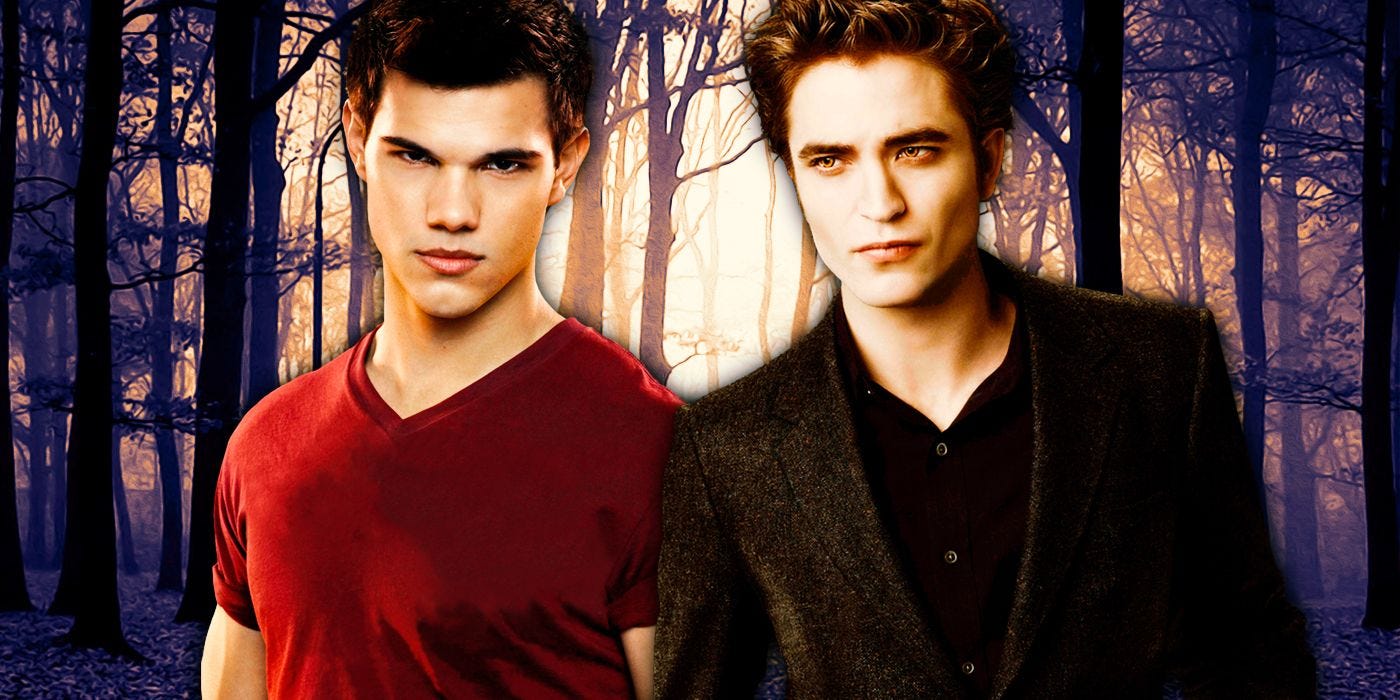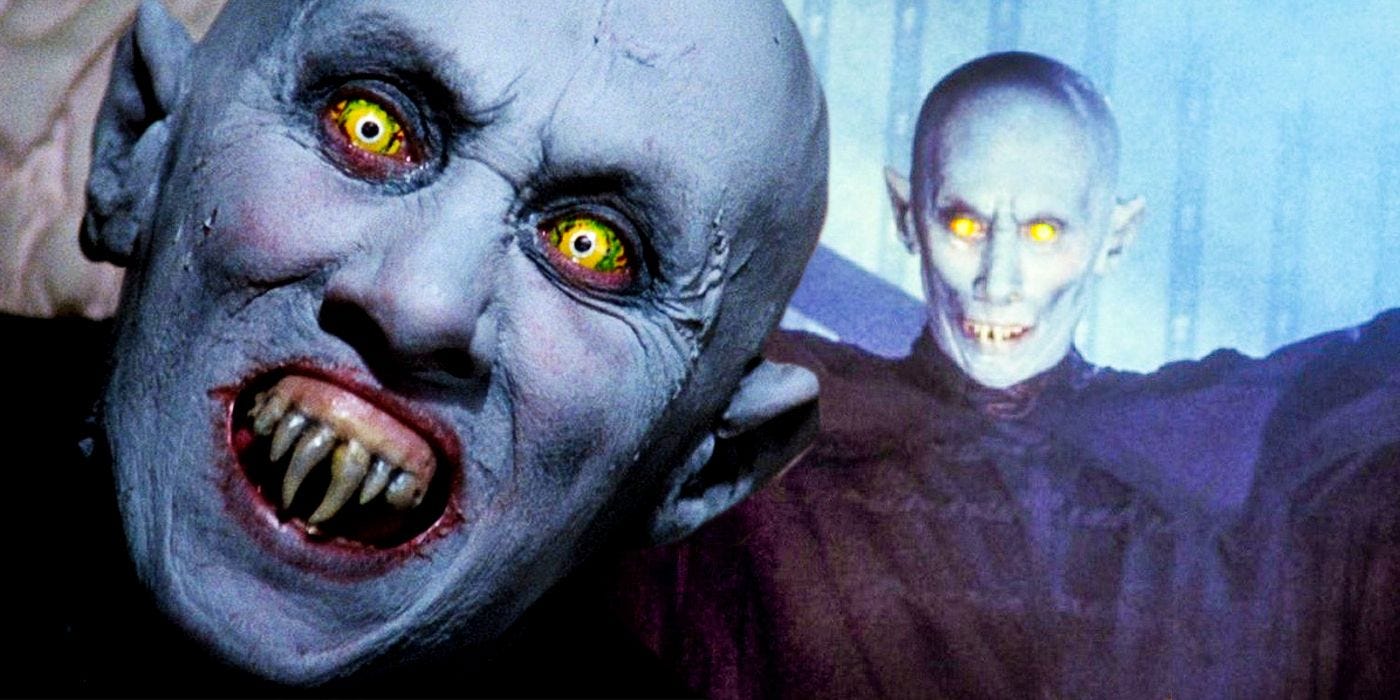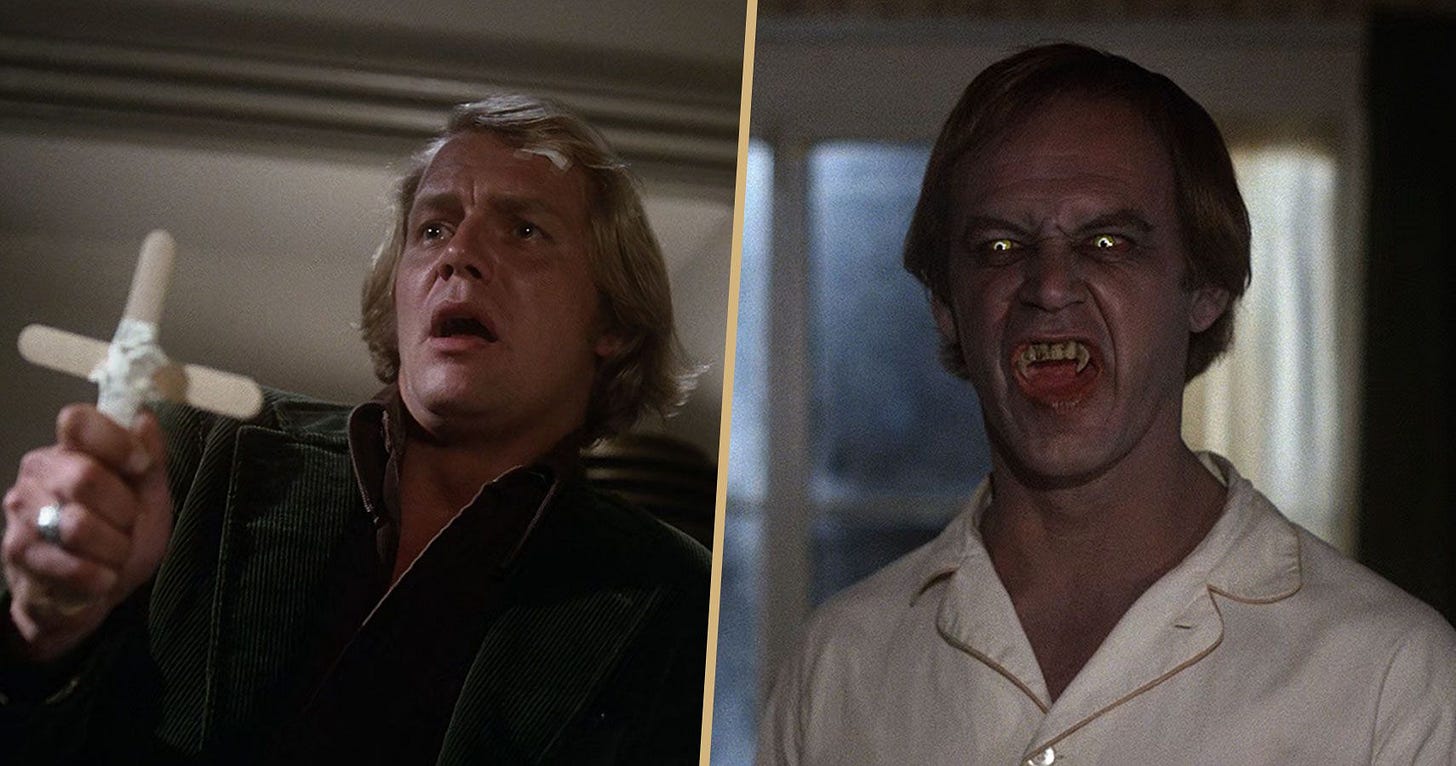If you’re new here, this is The Barrens, a Stephen King book club. If you’d like to join in, just read this intro here. We’ll talk books, what we liked, what we didn’t, what surprised us. This is meant to be a conversation, so please, join in! Write your own response reviews if you have a Substack. Reply to other people’s comments. Happy reading!
A note: Audio is some additional thoughts on the book and King’s work. Give it a listen if that’s your thing.
Some controversy we need to get out of the way.
I’m going to start out and say I’m not a vampire fan. I have never read a single vampire book (including, or maybe especially, Twilight), and I have never found them to be scary. Until ‘Salem’s Lot.
The problem with being a millennial is that vampires have generally sucked (no pun intended). We missed out on those early inspirations that stirred King’s imagination, Dracula, and the terrifying depictions of vampires in the EC Comics. Instead of those horrifying, larger than life monsters, we got Buffy the Vampire Slayer and my least favorite of all (sorry to all the fans out there), Twilight.
How did we move from Barlow to Edward?
What a tragedy and, again I’m sorry Twilight fans, but total loss of imagination. I don’t want hot human vampires in my stories. I want harrowing tales of survival against a darkness more powerful than any mortal. I want grit and blood and real danger. I want ‘Salem’s Lot!
King’s Inspiration
The story begins with the Marsten House, abandoned and vacant since the previous owner, Hubie Marsten, murdered his wife and hung himself. It was inspired by a real abandoned house that King played in as a child when he lived in Durham, Maine. He wandered those deserted rooms with his own friends, much like Ben Mears, a young writer and one of the main characters in ‘Salem’s Lot.
King also loved Dracula, and ‘Salem’s Lot was born from a question: what if vampires moved to Maine?
A young Stephen King gobbled up the infamous EC Comics, and in those stories, the vampires were a far cry from the sophisticated wine tasters of Dracula. They tore their victims apart like animals, fed compulsively on their blood, stalked them in the night. ‘Salem’s Lot married the two.
The Marsten House
The town kept its secrets, and the Marsten House brooded over it like a ruined king.
―Stephen King, ‘Salem's Lot
Here we find the hidden power behind abandoned buildings, something we sense but fail to explain. Their ghost shapes, the belongings left behind, form powerful specters in the human imagination. For Ben Mears, a writer haunted by the place the Marsten House since he was a young child, it is consuming.
After entering the house on a dare, he bolts into a bedroom to grab something, a souvenir as proof he was brave enough to go in. When he enters the room, he sees Hubie Marsten hanging from a rafter, his face grotesque, his eyes staring. He runs out of the house never to enter it again.
“Anyway, I slept with the light on in my bedroom for weeks after, and I’ve dreamed about opening that door off and on for the rest of my life. Whenever I’m in stress the dream comes.”
He returns to Jerusalem’s Lot to live in and write about the house. His pursuit is what I imagine many writers to be: to conquer some inner fear. If he can wrestle the idea of the house into reality, make its evil containable and rational, then he can let it slip from his mind.
But the house is occupied when he arrives, purchased by the mysterious Austrian, Kurt Barlow and his business partner, Richard Straker. Barlow is never seen around town, apparently on a buying trip, seeking out antiques to sell in the store he and Straker plan to open.
The house embodies evil, the subject of urban legends and late night dares by local teens. It towers over Jerusalem’s Lot, and seems to invite evil. The novel implies that the original owner, Hubie Marsten, knew Barlow, that the two wrote letters back and forth for years, and that Hubie prepared the way for his master, inviting him into the Lot long before Barlow came to make the house his residence.
They know that Hubie Marsten killed his wife, but they don’t know what he made her do first, or how it was with them in that sun-sticky kitchen in the moments before he blew her head in, with the smell of honey-suckle hanging in the hot air like the gagging sweetness of an uncovered charnel pit. They don’t know that she begged him to do it.
Some of the older women in town—Mabel Werts, Glynis Mayberry, Audrey Hersey—remember that Larry McLeod found some charred papers in the upstairs fireplace, but none of them know that the papers were the accumulation of twelve years’ correspondence between Hubert Marsten and an amusingly antique Austrian nobleman named Breichen, or that the correspondence of these two had commenced through the offices of a rather peculiar Boston book merchant who died an extremely nasty death in 1933…
-Stephen King, ‘Salem’s Lot
A string of child murders occurred after Marsten retired to ‘Salem’s Lot, a fact that Hubie Marsten’s sister-in-law divulged to Ben as he researched the house. He was a contract killer who worked for the mob, but after he turned his skills to children, the mob fired him. But Marsten may not have been killing children just for his amusement. He may have been preparing the town for Barlow’s eventual entry.
As soon as the house is inhabited again, another two children disappear.
First the dog, then the kids.
The body of a dog hung head-down from the wrought-iron gate, and the ground beneath was muddy with its blood.
Stephen King, ‘Salem’s Lot
King infamously goes after dogs and kids, the two no-no’s in writing. Readers hate it, and for good reason. People who abuse animals and children are the real life monsters we’re most afraid of.
Some readers are totally confused by the fact that King owns and loves dogs, yet kills them in his books. As if he and the character he writes are one and the same. That’s bizarre in and of itself. The scenes of child abuse depicted in ‘Salem’s Lot are called “totally skippable” by some readers. The thought is that the violence and depravity of characters can be alluded to without ever truly being known. I disagree.
If I were writing about Ted Bundy, could I allude to his evil without going into details? Yes. He was a man who had compulsive, evil urges that he acted out on women. But it’s vague, and vague writing is not good writing. There’s something else here, a reality that none of us want to acknowledge. Little towns invariably have a family, possibly more than one, abusing their children. It’s common, all too common. Including it, revealing the dark underbelly that ripples beneath the town’s fabric, is honest. Especially when we’re talking evil.
This is a brilliant move by King. As we’re getting to know the town, there’s an underlying feeling that there’s something rotten here. Had the first victims of Barlow and Slaker been Sandy McDougall, the young abusive mother of Randy McDougall, we wouldn’t have been scared. We would have been cheering. Off with their heads.
Instead, the first taken by the vampire are Danny and Ralphie Glick, two young boys taking a shortcut through the woods, whose lives are cut short. The little town where nothing ever happens gets its first taste of the new vampire in town.
The Little Evils of ‘Salem’s Lot
The skill at evoking the physical and psychological geography of a small community has of course become one of Mr. King's trademarks, and he is seldom more pithy, insightful, or humane than here. The foibles and peccadillos of the townspeople are not only laid before us in entertaining detail but are intricately linked to the town's subjugation and ultimate demise. The grand evil that comes to 'Salem's Lot uncovers a host of smaller evils - the common domestic crime that every community willfully conceals - and is empowered by them. it is not, finally, the vampires that kill 'Salems Lot, but rather a corruption in the town itself, or more correctly, in its people; a number of little sins that allow the greater villainy its hold upon the town's soul. Perhaps it's this, more than any other element, which so distinguishes the book for me: the sense that 'Salem's Lot is complicit, by dint of its apathy and its obtuseness, in its own destruction. The novel, after all, is not named after the vampire, but after the meat on which the vampire feasts. it is the victim's tale and it is, in essence, a four-hundred-page suicide note.
-Introduction by Barker to ‘Salem's Lot, by Stephen King, Collector's Edition, Plume, 1991
I love this introduction by Clive Barker. It points out something that I didn’t realize while reading the book. Barlow chooses Jerusalem’s Lot, is drawn to it, because it is already evil. The town draws evil there. Hubie Marsten came because ‘Salem’s Lot was already corrupt. Barlow followed for the same reason.
We already mentioned Sandy McDougall, the overwhelmed mother who hits her baby when he cries too much, and confesses it to no one but Father Callahan.
There is the adulteress wife, Bonnie Sawyer, and the man who sleeps with her, Corey Bryant.
Richie Boddin is the school bully, son of Derek Boddin, and nephew of the Franklin Boddin, the town drunk.
The crooked land dealer, Lawrence Crockett, who sells Barlow and Straker the Marsten House and covers their tracks to make more money.
Charlie Rhodes is the bus driver who torments kids and likes it.
Glynis Mayberry and Mabel Warts are the town gossips, always eager to spread the worst news about anyone and everyone.
Dud Rodgers is the custodian who lusts after Ruthie Crockett, the teenage daughter of Lawrence Crockett.
In this way, ‘Salem’s Lot takes on some of the justice themes of slasher movies. The little sins have to be repaid in the cycle of justice. The cost is your life.
The town knew about darkness.
It knew about the darkness that comes on the land when rotation hides the land form the sun, and about the darkness of the human soul. The town is an accumulation of three parts which, in sum, are greater than the sections. The town is the people who live there, the buildings which they have erected to den or do business in, and it is the land.
-Stephen King, ‘Salem’s Lot
Kid Hero
“You have forgotten the doctrine of your own church, is it not so? The cross…the bread and wine…the confessional…only symbols. Without faith, the cross is only wood, the bread baked wheat, the wine sour grapes. If you had cast the cross away, you should have beaten me another night…The boy makes ten of you false priest.”
-Stephen King, ‘Salem’s Lot
The only person who stands a chance against Barlow is the kid, Mark Petrie. He is, to his father’s dismay, obsessed with comic books and pulp stories, an avid horror fan. When a vampire takes over the town, he is one of the first to notice and take action, going .
I can’t help but wonder if there is a little bit of wishful thinking on King’s part. After all, he was that kid. His writing was repeatedly disparaged by teachers and parents who thought of it as nothing but trash. If he had the chance to face any of the monsters that decorate the covers of those famous men’s magazines that he wrote for, or comic books that he devoured, he might be the best prepared.
In the end, Mark and Ben are the only two who escape the town, returning after during the day, knowing the undead sleep behind shuttered windows in dark houses, leaderless with Barlow dead, waiting for the night to come.
The Priest
Father Callahan is perhaps the only one outwardly capable of dealing with a vampire. He is a priest, well versed in the occult, but his faith is fading. He is an alcoholic, driven to drink partially by the underlying rot of the town, the burden of living in a place that is inwardly wicked.
When Barlow comes around, Father Callahan finally gets the chance to fight real evil, something that he has been wrestling with as his faith wanes in the little town of Jersualem’s Lot. But when he gets the chance, his faith is not strong enough. Barlow tells him to cast his crucifix away if he really has faith.
“Stay back,” Callahan said hoarsely, retreating a step. “I command it in the name of God.”
Barlow laughed at him.
The glow int he cross was only a thin and guttering light in a cruciform shape. The shadows had crept across the vampire’s face again, masking his features in strangely barbaric lines and triangles under the sharp cheekbones.
Callahan took another step backward, and his buttocks bumped the kitchen table, which was set against the wall.
“Nowhere left to go,” Barlow murmured sadly. His dark eyes bubbled with infernal mirth. “Sad to see a man’s faith fail. Ah, well…”
-Stephen King, ‘Salem’s Lot
Stephen King expands on this scene himself in book 6 of The Dark Tower series.
“Sad to see a man's faith fail,” the vampire Kurt Barlow had said, and then he'd plucked Don Callahan's dark and useless cross from his hand. Why had he been able to do that? Because - behold the paradox, consider the riddle - Father Callahan had failed to throw the cross away himself. Because he had failed to accept that the cross was nothing but one symbol of a far greater power, one that ran like a river beneath the universe, perhaps beneath a thousand universes - I need no symbol.
- Stephen King, The Dark Tower VI:Song of Susannah
This seems to be the end of the end, as Barlow takes on the image of Father Callahan’s boyhood closet monster, Mr. Flip. The one he always saw peeking out in the darkness, and now confronts face to face. Barlow cuts open a vein in his own throat, and forces Callahan to drink his blood, damning him with the “Mark of Cain.”
A connection to Callahan’s failure in It.
There is a thread between this underlying key to defeat Barlow, faith, and the odd actions and rituals that defeat Pennywise, the monster from King’s story It. Each child confronted by the monster has a different way to fight him, ranging from Eddie’s inhaler to Ben’s riddles to help with his stuttering. Often, their greatest weaknesses are imbued with the power needed to hold Pennywise back.
Vampire Lore
Garlic, holy water, roses, the crucifix, a wooden stake. There’s a lot to unpack here, and I’ll be honest, I’m not the one to do it. I’m counting on you, dear readers, to chip in what you know about vampires in the comments. Here’s what stood out to me from the book.
Doc, the dog found dead early on in the novel, is killed by Straker because he has white spots on his eyes, something that vampires fear.
“One way to frighten a vampire away is to paint white ‘angel eyes’ over the eyes of a black dog. Win's Doc was all black except for two white patches. Win used to call them his headlights - they were directly over his eyes. He let the dog run at night. Straker must have spotted it, killed it, and then hung it on the cemetery gate.”
Apparently, dogs and vampires don’t get along. Dogs sense a vampire’s predatory nature and react accordingly. To prepare the way for his master, Straker gets rid of the roaming dog, and hangs him on the cemetery gate.
Barlow can not enter Jerusalem’s Lot until a sacrifice is made. Straker paves the way by killing Ralphie Glick, and performing a Satanic ceremony to appease the devil and allow the vampire passage into the town.
How can Straker do all these human things? Well, because he is not a vampire, but a familiar, a servant to Barlow who is human, but endowed with some of Barlow’s powers. Thus he walks around in the day, is seen in town out and about, and performs the initial duties necessary to get Barlow there.
You see us as a Teacher, a Doctor, a Writer, a Beauty, a Nerd, a Priest…the…Vampire Killing Club?
(If you know, you know…it’s The Breakfast Club people. Come on!)
As people in town start to suspect that vampires may be responsible for the string of deaths and disappearances throughout Jerusalem’s Lot, weapons are researched and gathered. Susan, Ben Mears, Matt Burke, Jimmy Cody, Father Callahan, and Mark Petrie form the unlikely group that takes a stand against Barlow and his undead vampire colony in the making.
They research, gather crucifixes, collect holy water, attempt to buy roses (Straker bought them all) and garlic. They sharpen stakes and use them to kill. All of it seems effective, but what they lack is thousands of years of experience against an undead superbeing.
Of the group, only Ben Mears and Mark Petrie survive unscathed, leaving the town, filled with their dead and undead friends and relatives, behind.
But first, they defeat Barlow.
In a last attempt to kill the master vampire, Ben and Mark, the writer and the young horror fan, track Barlow to Eva Miller’s boarding house, where he stays in the basement during the day. They bathe themselves in holy water as protection. When they find Barlow’s coffin, they drag it out, open it, and drive a wooden stake through his heart.
The book ends with Ben and Mark’s return to the town. They come ready to finish what they started, to defeat the evil there. Knowing they don’t stand a chance with the heavily wooded area and so many places for vampires to hide, Ben starts a brush fire in the nearby woods to destroy the town and drive them out.
In the small clearing overlooking the power lines, the fire in the brush began to burn more strongly, urged by the autumn wind that blew from the west.
-Stephen King, ‘Salem’s Lot
I know it’s on point…but…a little anti-climactic? I know, I know, but I feel this way with every monster that dies in King novels. They’re just so nefarious and successful for so long, and then, poof, stake through the heart and they’re gone.
Contemporary stories have totally stripped vampires of all their traditional meaning. They should represent real, pure evil, monsters with a direct servitude and worship of Satan. They kill animals and people, sacrifice and drink blood. They seek out the darkest of the dark. If it was up to me, I’d kick Twilight out the freaking door and keep the ‘Salem’s Lot vampires all day.
So how did you like it? Was it scary? If it was, what scene stuck with you? I can’t wait to discuss, and I hope you all know more about vampires than I do!
What do you make of Hubie Marsten’s correspondence with Barlow? Are the child murders a sacrifice of some kind, similar to what Straker does with Ralphie Glick?
Does it annoy you when King writes writers as his main characters? Writers who are exceptionally smart and know right off the bat that it’s a vampire walking the dark streets of Jerusalem’s Lot?
Did you realize that ‘Salem’s Lot is just a short nickname for Jerusalem’s Lot, or did it take you two read-throughs and some googling to pay attention to that tiny apostrophe on the cover?












This is a fabulous review and dead on (no pun intended). I have been a Stephen King fan since the mid-1970s, and 'Salem's Lot was the first book of his that I ever read. It remains my favorite to this day, though King has since written many tremendous books.
This is an excellent write up of a great novel. I'm currently teaching this book in a college class and the angle I'm taking is centred around King proclaiming that he was writing the Great American Novel, just with vampires. So my guided analysis looks at King's view of 1975's modern America, and suburbia specifically, and the perspective seems pretty grim about how he views where his own country is at. A connected small town is riddled with gossip and everyone there is the presented horror of the town and tale well before any vampiric elements start working.
Reading your post made me consider; he also shows that there is no hope from our usual saviours [church, school, family]; that capitalism is the foothold for all evil; and that maybe America is sinking into such a cesspool that it's a beacon for worse evil to come and snuggle in to make a nest for itself for the future.
I love that the Prologue undercuts most tensions because we know who lives [and can intuit from that who dies] and so our focus isn't on that anymore, it's on exploring The Lot, and the people of the town. And as for the ending, the monster might be defeated somewhat easily, but we already know it ends with our heroic American men fleeing the country across the border so the victory doesn't seem to work on a personal level for them, and it leads one to think perhaps the country itself is ost for good regardless, and we knew this from the start of the book.
Such a great book, and thanks for sharing that Barker intro, I'd never read that before.